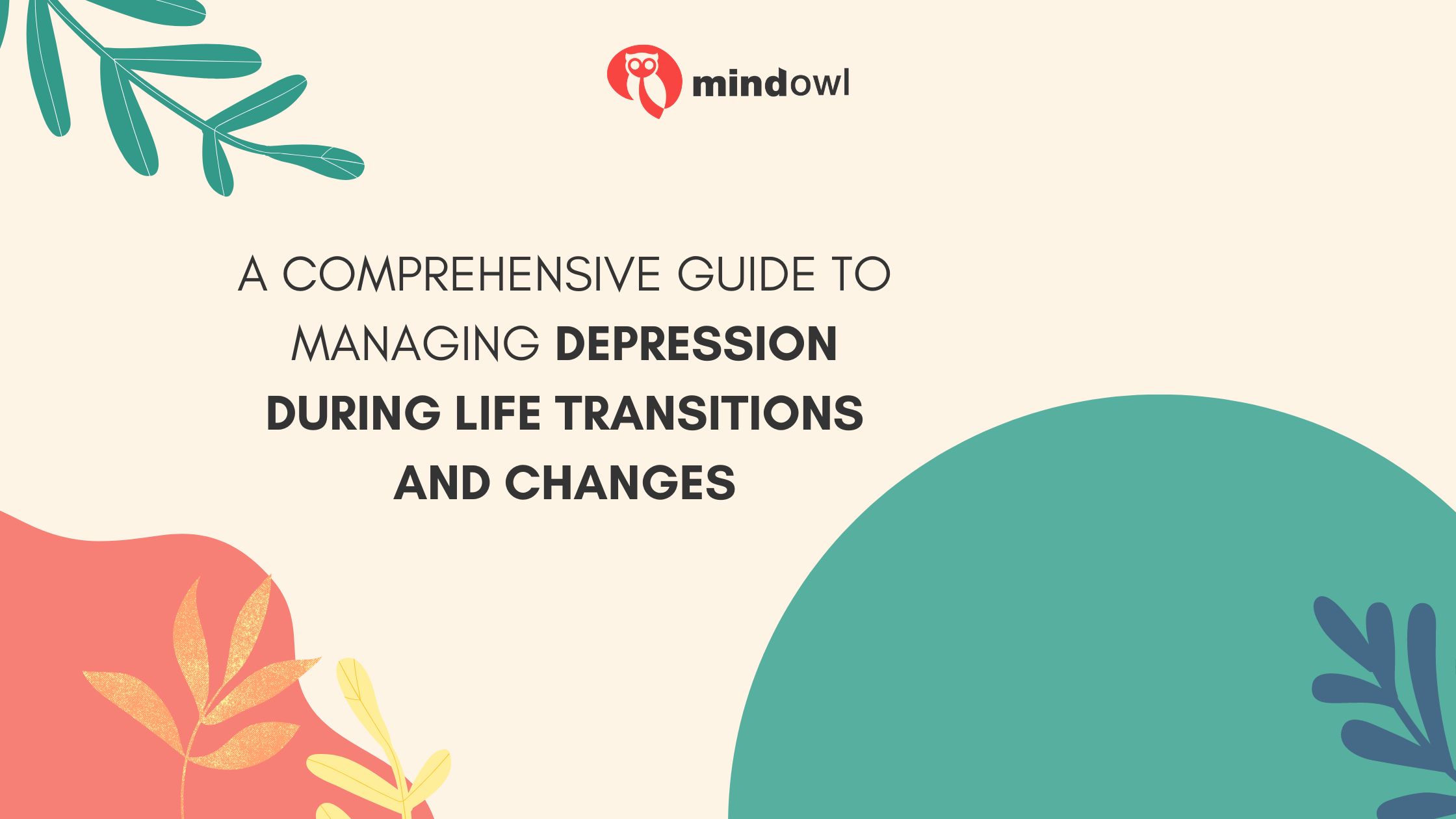Life is a tapestry of transitions and changes, each thread representing a different phase, challenge, or opportunity. While these changes can be exciting and rejuvenating, they can also be daunting, stirring up feelings of uncertainty and anxiety. For many, these transitions can lead to or exacerbate depression, a formidable foe that clouds your outlook and dampens the spirit. Recognizing the onset of depression during these times is crucial, as it allows you to address it head-on with informed strategies and a compassionate approach.
Depression, particularly in the face of significant life changes, can feel isolating, but remember, you’re not alone. Countless others navigate this stormy sea, seeking safe harbor. This guide is designed as a beacon of hope and a repository of practical strategies to manage depression during these fluctuating times. By engaging with these strategies, you can weather the storm and learn to sail the shifting seas with resilience and grace, turning challenges into stepping stones for growth and self-discovery.

Recognizing The Signs Of Depression
The journey to managing depression begins with recognition. Understanding the subtle and overt signs of depression is paramount. Symptoms such as persistent sadness, a lack of interest in activities once enjoyed, changes in appetite or sleep patterns, and feelings of worthlessness can all be indicators. Monitoring these symptoms without judgment and acknowledging their impact on your daily life is essential.
Taking proactive steps to monitor your mental health can make a significant difference. Regular self-reflection, perhaps through journaling or mindfulness practices, can help you stay attuned to your emotional state. This self-awareness is a critical first step in recognizing the need for change or support. It’s a way of checking in with yourself and ensuring your mental and emotional needs are being addressed.
Opening up about your feelings with trusted friends or family members can be incredibly therapeutic. It creates a space for empathy and understanding, reminding you that support is available. Sometimes, the act of vocalizing your feelings can provide relief and a fresh perspective on your situation. Remember, seeking help and expressing vulnerability is a sign of strength.
Seeking Professional Help
There’s immense strength in recognizing when you need help and taking the step to seek professional support. Mental health professionals and treatments such as those offered on this site can offer a level of guidance and expertise that goes beyond what friends and family can provide. Whether through therapy, counseling, or medication, professional help can be tailored to your specific needs and circumstances.
Finding the right mental health professional is a personal journey and may require trying out a few therapists or counselors before finding the best fit. It’s important to feel comfortable and understood by your therapist, as this relationship is foundational to effective treatment. Don’t hesitate to advocate for yourself and your needs throughout this process.
Therapy can offer new perspectives, coping strategies, and insights into your behavior and thought patterns. It’s a space dedicated to your well-being, where you can explore your feelings, challenges, and aspirations in a supportive and non-judgmental environment. Embracing this support can be a significant step towards managing depression and navigating life’s transitions more effectively.
Establishing A Support System
Building a solid support system is like constructing a safety net that catches you when you fall. Surround yourself with people who understand and empathize with your journey. This network can include close friends, family members, support groups, or mental health professionals. Their support can be a source of comfort, advice, and practical assistance when you need it most.
Communicating openly with your support network about what you’re going through and how they can help is crucial. Sometimes, the people around you want to help but might not know how. By expressing your needs clearly, whether it’s for a listening ear, help with daily tasks, or companionship, you make it easier for them to provide the support you need.
Navigating Divorce with Professional Support
Divorce is one of the most challenging life transitions, often leading to significant emotional distress. In addition to seeking support from mental health professionals, consulting with a divorce lawyer can be an essential step in navigating the legal complexities of divorce. A divorce lawyer can provide clarity on your rights and obligations, helping to reduce the stress and uncertainty that comes with the dissolution of a marriage. This legal support is crucial in ensuring that you can focus on your mental health and well-being during this difficult time. Managing depression effectively during a divorce requires a holistic approach that includes legal, emotional, and psychological support.
Prioritizing Self-Care
Caring for yourself is a crucial element in managing depression. It means making time to tend to your physical, emotional, and mental well-being. This often involves fundamental practices like ensuring proper nutrition, getting enough sleep, and engaging in regular exercise. A balanced diet provides vital nutrients for your body, sufficient rest rejuvenates your energy levels, and consistent physical activity can greatly uplift your mood by releasing endorphins.
Self-care also encompasses mindfulness and relaxation techniques. Activities like meditation, deep breathing, and yoga can reduce stress and promote a sense of inner peace. It’s about finding moments of calm in the day to reconnect with yourself, away from the chaos of life’s transitions.
Moreover, self-care involves setting healthy boundaries. It’s okay to say no to demands that stretch your limits or compromise your well-being. Recognizing your limits and communicating them clearly to those around you not only protects your energy but also teaches others how to treat you, fostering relationships that respect your need for balance and self-care.

Developing Healthy Coping Mechanisms
In the face of depression, especially during times of change, developing healthy coping mechanisms is vital. These are the tools and strategies you use to navigate through difficult emotions and situations. Distinguishing between healthy coping mechanisms, like engaging in physical activity or pursuing hobbies, and unhealthy ones, such as substance abuse or withdrawal from social interaction, is essential.
Healthy coping strategies involve activities that not only help you deal with the present moment but also contribute to your long-term well-being. This could include creative outlets like painting or writing, which allow you to express emotions in a constructive way, or physical activities that help release pent-up tension. Engaging in these activities can provide a sense of accomplishment and pleasure, countering feelings of sadness or worthlessness.
Another key aspect of healthy coping is learning to accept and process your emotions. Instead of pushing feelings away or self-criticizing, try to observe them without judgment. Techniques like mindfulness can be particularly helpful, as they encourage you to stay present with your feelings, recognizing them as temporary states that don’t define your worth or capabilities.
Setting Realistic Goals
Setting realistic goals during times of transition can guide you through the fog of depression. These goals provide direction and a sense of purpose, which can be particularly grounding when everything else seems in flux. It’s essential to set goals that are achievable and aligned with your current capabilities, as this ensures a sense of progress and achievement.
Breaking down larger goals into smaller, manageable tasks can make them seem less daunting and more attainable. This approach can help maintain motivation and provide regular moments of accomplishment, which are essential for boosting self-esteem and combating feelings of inadequacy or despair that often accompany depression.
Flexibility is vital in goal setting. Life’s inherent unpredictability means that circumstances can change, potentially impacting your ability to meet specific goals. Instead of viewing these changes as failures, see them as opportunities to adapt and learn. Being kind to yourself and adjusting your goals accordingly can help maintain your sense of agency and resilience.
Embracing Change As An Opportunity
Change, while often the source of stress and anxiety, also holds the potential for growth and new experiences. Viewing change as an opportunity rather than a threat can significantly alter your emotional response to it. This shift in perspective can help mitigate feelings of depression by fostering a sense of optimism and possibility.
Reflecting on past experiences of change can be enlightening. Consider times when you’ve successfully navigated transitions and the strengths and insights you gained from those experiences. This exercise can bolster your confidence in your ability to handle current and future changes, reminding you of your resilience and adaptability.
Staying open to the opportunities that arise from change can lead to unexpected benefits. What might initially seem like a setback could open the door to new paths and possibilities. Embracing change can transform challenges into valuable life lessons, contributing to personal growth and a deeper understanding of yourself and the world around you.
Maintaining Routine
A consistent routine provides a framework of stability in the midst of change, anchoring you amidst the swirling currents of life’s transitions. Maintaining regular patterns of behavior, such as consistent meal times, sleep schedules, and daily activities, can impart a sense of normalcy and control, which is incredibly comforting during turbulent times.
Incorporating activities that contribute to your well-being into your routine is crucial. Whether it’s a morning jog, a nightly reading session, or a weekly catch-up with friends, these activities can serve as touchstones, reminding you of your interests and priorities outside of the immediate stresses.
Adjusting to a new routine may require time and patience. Be gentle with yourself during this process, allowing for flexibility and adjustments as needed. Recognizing that routines are tools for your well-being, not rigid structures to adhere to strictly, can help you use them in a way that supports your mental health.
Limiting Exposure To Stressors
Identifying and minimizing stress-exacerbating factors is crucial in managing depression during times of change. Stressors can amplify feelings of depression and make it more challenging to cope with daily life. By recognizing what exacerbates your stress and taking steps to minimize these factors, you can create a more manageable and less overwhelming environment for yourself.
Limiting exposure might involve setting boundaries around work, reducing time spent on social media, or distancing yourself from negative influences. Prioritize your well-being and make conscious choices about what you allow into your life. Remember, it’s okay to say no to situations or commitments that drain your energy or contribute to your stress.
Creating a peaceful and supportive environment can also involve seeking out positive experiences and relationships. Engaging with people and activities that uplift you can counterbalance the effects of stressors. Surrounding yourself with positivity can help shift your focus from what’s draining to what’s replenishing, fostering a sense of balance and well-being.
Practicing Gratitude
Cultivating gratitude can transform your perspective, shifting the focus from what’s lacking in your life to the abundance that exists. This shift can be particularly powerful when coping with depression, as it encourages a more positive outlook. Keeping a gratitude journal, where you note down things you’re thankful for each day, can be a simple yet effective practice.
Gratitude can also enhance your relationships and overall sense of connection. By expressing appreciation for the people around you, you not only strengthen your bonds with them but also create a more supportive and positive environment for yourself. This mutual exchange of gratitude can foster a sense of community and belonging, which is essential during challenging times.
Practicing gratitude doesn’t mean ignoring difficulties. It’s about balancing your awareness of these challenges with an appreciation for the good. It’s a way of acknowledging the complexity of life while choosing to focus on aspects that bring joy and fulfillment.
Engaging In Positive Social Interactions
Positive social interactions can serve as a lifeline during periods of depression. Connecting with others, sharing experiences, and feeling understood can significantly alleviate feelings of isolation and despair. Seek out social engagements that uplift and energize you, even when the inclination might be to withdraw.
Engaging in group activities, whether related to hobbies, sports, or community service, can provide a sense of belonging and purpose. These activities offer an opportunity to connect with others who share similar interests, creating a supportive network that extends beyond the confines of your immediate challenges.
Be selective about your social interactions, prioritizing quality over quantity. Surround yourself with individuals who are empathetic, positive, and supportive. Positive social environments can foster a sense of well-being and provide relief from the internal struggles associated with depression.
Managing Financial Stress
Financial stress is a common trigger for depression, especially during life transitions that might involve changes in employment, relocation, or other significant financial commitments. Taking proactive steps to manage your finances can alleviate some of this stress, providing a sense of control and stability.
Creating a budget, seeking financial advice, and exploring ways to reduce expenses can help manage financial stress. It’s also beneficial to explore additional income streams or professional development opportunities that may enhance your financial stability.
Recognizing the emotional impact of financial stress is also crucial. It’s okay to seek support from financial advisors, friends, or family members who can provide strategies to cope with the stress associated with economic uncertainties.
Conclusion
Navigating the complexities of depression during life’s transitions demands courage, understanding, and a proactive approach to self-care and support. This comprehensive guide has offered strategies and insights to help manage depression, from recognizing the signs and establishing a support system to embracing change and celebrating resilience.
Celebrate your progress, lean on your support network, and continue to explore strategies that resonate with your unique experience. Your path through these transitions, guided by self-compassion and resilience, can lead to profound growth and a deeper connection with yourself and those around you.
MindOwl Founder – My own struggles in life have led me to this path of understanding the human condition. I graduated with a bachelor’s degree in philosophy before completing a master’s degree in psychology at Regent’s University London. I then completed a postgraduate diploma in philosophical counselling before being trained in ACT (Acceptance and commitment therapy).
I’ve spent the last eight years studying the encounter of meditative practices with modern psychology.

